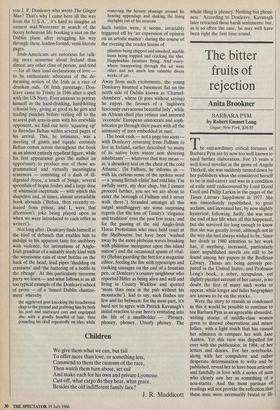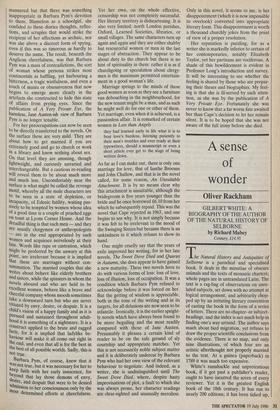The bitter fruits of rej ection
Anita Brookner
BARBARA PYM by Robert Emmet Long
Ungar, New York, $16.95
The extraordinary critical fortunes of Barbara Pym are by now too well known to need further elaboration. For 13 years a well-loved novelist in the genre of Angela Thirkell, she was suddenly turned down by her publishers when she considered herself to be in mid-career and was in a condition of exile until rediscovered by Lord David Cecil and Philip Larkin in the pages of the Times Literary Supplement in 1977. She was immediately republished, to great acclaim, and increased her, by now slightly hysterical, following. Sadly, she was near the end of her life when all this happened, but she survived for long enough to know that she was greatly loved, although not in the way she had always wished to be. Since her death in 1980 attention to her work has, if anything, increased, particularly since unpublished novels are still to be found among her papers in the Bodleian Library. Theses are being actively pre- pared in the United States, and Professor Long's book, a sober, scrupulous, yet slightly puzzled account of her career, is no doubt the first of many such works to appear, while longer and fuller biographies are known to be on the stocks.
Were the story to remain as condensed as this it would be possible to continue to see Barbara Pym as an agreeable absurdist, writing stories of middle-class women given to shrewd observations and minor follies, with a light touch that has caused her admirers to compare her with Jane Austen. Yet this view was dispelled for ever with the publication, in 1984, of her letters and diaries. For her notebooks, along with her compulsive and rather desperate determination to write and be published, reveal her to have been artlessly and fatefully in love with a series of men who clearly saw her as something of a non-starter. And the most partisan of readings will not provide the reflection that these men were necessarily brutal or ill- mannered but that there was something inappropriate in Barbara Pym's devotion to them. Blameless as a schoolgirl, she confided to these diaries thoughts, reflec- tions, and scruples that would strike the recipient of her affections as archaic, nor was she above a discreet form of spying, even if this was so timorous as hardly to deserve the name. The result, beneath the Anglican cheerfulness, was that Barbara Pym was a mass of contradictions, the sort of woman whose persona strikes most continentals as baffling, yet harbouring a bitterness, a tragic wistfulness, and even a touch of mania or obsessiveness that now begins to emerge more clearly in the artefacts she constructed to hide this state of affairs from prying eyes. Since the publication of A Very Private Eye, the harmless, Jane Austen-ish view of Barbara Pym is no longer tenable.
For her preoccupations can now be seen to be directly transferred to the novels. On the surface these are very mild. They are about how to get married if you are extremely good and go to church or work In a library and know nothing about sex. On that level they are amusing, though lightweight, and curiously unvaried and interchangeable. But a cautious re-reading will reveal them to be about much more and much less. Uncomfortably near the surface is what might be called the revenge motif, whereby all the male characters are to be seen in a state of depletion, or Incapacity, of Edenic futility, waiting pas- sively to be tempted by women whose idea of a good time is a couple of poached eggs on toast at Lyons Corner House. And the dreadful thing is that such men — and they are usually clergymen or anthropologists — are in the end appropriated by such women and acquiesce nervelessly at their fate. Words like rape or castration, which might be proferred by the unwary at this Point, are irrelevant because it is implied that these are marriages without con- summation. The married couples that she writes about behave like elderly brothers and sisters, while the spinsters in whom the novels abound and who are held to be excellent women, behave like a brave and cheerful company whose moods sometimes take a downward turn but who are never vitiated by envy, desire, or despair. It is a child's vision of a happy family and as it is pursued and sustained throughout adult- hood it is something of a nightmare. It is a construct applied to the brute and ragged facts, for it is implied that ladylike be- haviour will make it all come out right in the end, and even that all is for the best in the best of all possible worlds. Sadly, this is not true.
Barbara Pym, of course, knew that it ,was not true, but it was necessary for her to beyond faith with her early innocence, for u_eyond that lay those demons of envy, desire, and despair that were to be denied admission to her consciousness only by the most determined efforts at cheerfulness. Yet her own, on the whole effective, censorship was not completely successful. Her literary territory is disheartening. It is also very limited: north London parishes, Oxford, Learned Societies, libraries, or small villages. The same characters turn up again and again and they are either shabby but resourceful women or men in the last stages of abstraction. They appear to be about duty to the church but there is no hint of spirituality in them: rather it is as if churchgoing or speculation about clergy- men is the maximum permitted entertain- ment in a good woman's life.
Marriage springs to the minds of these good women as soon as they see a furniture van debouching in the neighbourhood, for the new tenant might be a man, and as such he might well do for one or other of them. Yet marriage, even when it is achieved, is a passionless affair. It is remarked of certain women in Less than Angels
they had learned early in life what it is to bear love's burdens, listening patiently to their men's troubles and ever ready at their typewriters, should a manuscript or even a short article ever get to the stage of being written down.
As far as I can make out, there is only one marriage for love, that of Ianthe Broome and John Challow, and that is in the novel called, for some reason, An Unsuitable Attachment. It is by no means clear why this attachment is unsuitable, although the bridegroom is five years younger than the bride and he once borrowed £6.10 from her which he subsequently repaid. This was the novel that Cape rejected in 1963, and one begins to see why. It is not simply because it was felt to be irrelevant to the mood of the Swinging Sixties but because there is an unkindness in it which refuses to show its hand.
One might cruelly say that the years of exile improved her writing, for in her late novels, The Sweet Dove Died and Quartet in Autumn, she does appear to have gained a new maturity. These two novels have to do with various forms of loss: loss of love, loss of illusion, loss of occupation. It was a condition which Barbara Pym refused to acknowledge before it was forced on her. But the getting of wisdom is appreciable, both in the tone of the writing and in its targets, for all delusions are now seen to be infantile. Ironically, it is the earlier spright- ly novels which have always been found to be more beguiling and the most readily compared with those of Jane Austen. Presumably it pleases a certain kind of reader to be on the safe ground of sly courtship and appropriate matches. Yet this is not necessarily noble subject matter and it is deliberately undercut by Barbara Pym who had her own view of the relevant behaviour to negotiate. And indeed, as a writer, she is undistinguished until The Sweet Dove Died, where, despite hasty improvisations of plot, a fault to which she was always prone, her character readings are clear-sighted and unusually merciless. Only in this novel, it seems to me, is her disappointment (which it is now impossible to overlook) converted into appropriate literary form. This disappointment is worth a thousand churchly jokes from the point of view of a proper resolution.
Her reputation is puzzling, for as a writer she is markedly inferior to certain of her contemporaries, notably Elizabeth Taylor, yet her partisans are vociferous. A shade of this bewilderment is evident in Professor Long's introduction and survey. It will be interesting to see whether the feeling is shared by those who are prepar- ing their theses and biographies. My feel- ing is that she is ill-served by such atten- tion, as she was by the publication of A Very Private Eye. Fortunately she was never to know that a far worse fate awaited her than Cape's decision to let her remain silent. It is to be hoped that she was not aware of the full irony before she died.



















































 Previous page
Previous page